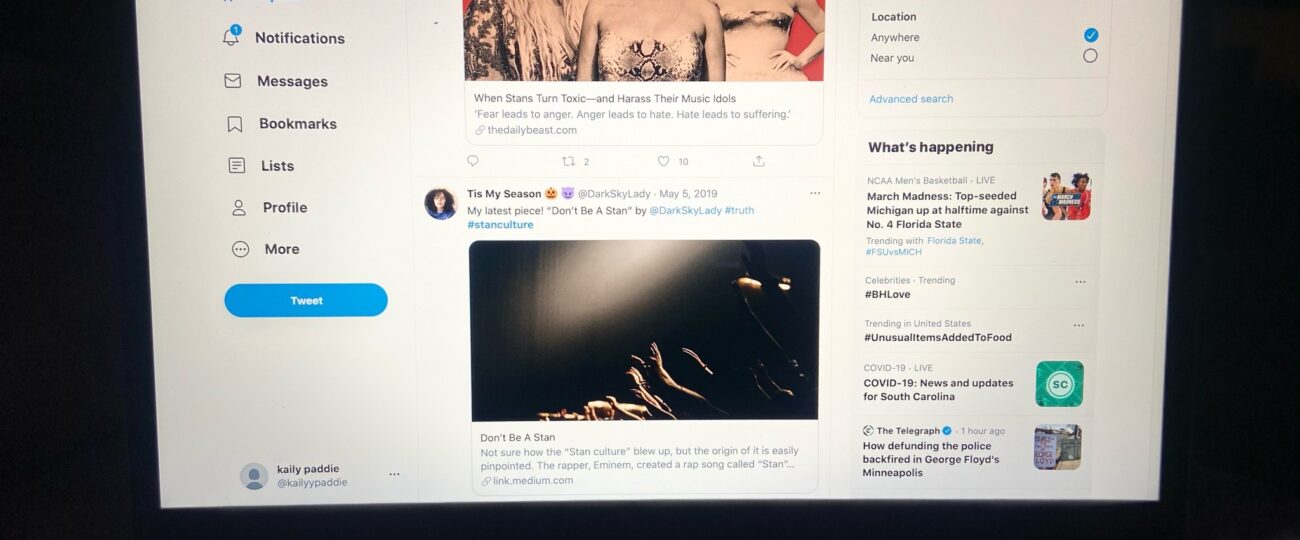Nowadays, due to internet lingo and words taken from Twitter, when you like a music artist or band, it is said that you stan them. For example, I personally like Harry Styles, so you could say that I am a Harry Styles stan. However, attaching yourself to the word stan might not be the best thing to do.
Stan culture, along with cancel culture, is seen as very toxic. Why? Many stans of certain artists, bands, even TV shows have been rude to those who dislike those artists, bands and TV shows. Not only that, many stans of certain bands will gatekeep and say that you can’t like a certain member or you can’t listen to that band. The only personal experience I’ve had with stan culture happened when I was in middle school. I was in eighth grade, and I had only really listened to classic rock up until this point. I was beginning to go through my emo phase, and I had asked two of my friends who some of their favorite bands were that made emo-type music. They told me All Time Low, Fall Out Boy, Panic! At The Disco, Sleeping With Sirens, My Chemical Romance, etc.
I started listening to their music and quickly became obsessed with members as well. Of course, as most fans do, I started picking out who my favorite members were. When I went back to school to talk to my friends about it, they immediately started gatekeeping the bands.
“You can’t have him; he’s mine,” or “Why don’t you go back to listening to that old rock music.”
It really hurt me at the time, but knowing how bad stan culture has gotten, I only got the tip of the iceberg.
One of the most toxic group of stans are the K-pop stans. More specifically, the BTS stans. Several Black fans have shared stories of racism within the BTS fandom, also known as ARMY. One fan told Buzzfeed News in 2018, “I’ve been called ni**** and also told to go pick cotton and it’s always anonymous. But they always let me know they’re Armys because they end their message [with] ‘we don’t claim you in Army’.”
Sophomore social work major Franchesca Ross said, “As a huge K-POP fan, the toxicity of stan culture in the community is pointless.”
Another example of toxic stans are the Nicki Minaj stans, also known as the Barbz. A writer for British GQ wrote an article about Cardi B adopting Minaj’s style of music and the Barbz did not hesitate in attacking the writer. The Barbz started tweeting at the writer, and messaging her on Instagram and commenting on her and friends’ posts across different social media platforms. She received hundreds of death threats, members of the Barbz stan community saying things like, “You better to delete that before we get your address and start hunting you and your family down!!”
Apparently, stans of the cartoon Steven Universe are pretty brutal as well.
According to an article from The Daily Star, “An artist (Zamii070) was driven to suicide because her art didn’t appeal to the fandom. … The worst thing is that some of the cyber bullies didn’t apologise, but rather gloated that they were able to make Zamii attempt suicide. There is speculation on whether Zamii did attempt or not but the bullying is not justifiable.”
“As a huge anime fan, it’s hard not to associate myself with other fans,” said James Goodman, a freshman musical the- atre major. “However, some fans are so brutal online. I don’t want people thinking that I’m like that.”
“I’m a huge Harry Potter fan, but some of the other fans are extremely toxic,” said Kerry Gareau, a freshman musical theatre and political science major.
“I’ve never had any type of bad experience personally, but I’ll see on- line, Twitter especially, other fans gatekeeping characters. A lot of stans also will bully you sometimes if you call yourself a fan if you’ve only seen the movies.”
Stan culture is not necessarily as bad as cancel culture. However, stan culture is extremely toxic, and it should stop now.
Photo by Kaily Paddie




